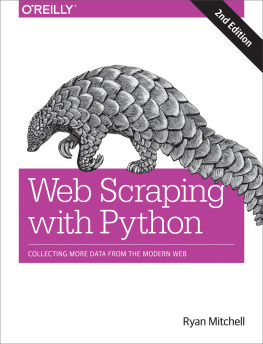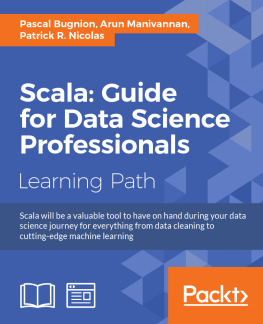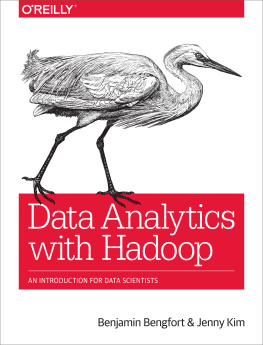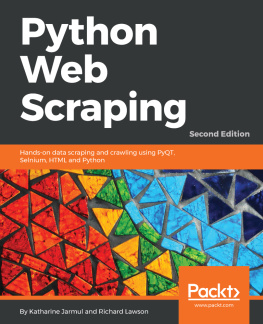Dimitrios Kouzis-Loukas - Learning Scrapy
Here you can read online Dimitrios Kouzis-Loukas - Learning Scrapy full text of the book (entire story) in english for free. Download pdf and epub, get meaning, cover and reviews about this ebook. year: 2016, publisher: Packt Publishing, genre: Home and family. Description of the work, (preface) as well as reviews are available. Best literature library LitArk.com created for fans of good reading and offers a wide selection of genres:
Romance novel
Science fiction
Adventure
Detective
Science
History
Home and family
Prose
Art
Politics
Computer
Non-fiction
Religion
Business
Children
Humor
Choose a favorite category and find really read worthwhile books. Enjoy immersion in the world of imagination, feel the emotions of the characters or learn something new for yourself, make an fascinating discovery.

- Book:Learning Scrapy
- Author:
- Publisher:Packt Publishing
- Genre:
- Year:2016
- Rating:3 / 5
- Favourites:Add to favourites
- Your mark:
Learning Scrapy: summary, description and annotation
We offer to read an annotation, description, summary or preface (depends on what the author of the book "Learning Scrapy" wrote himself). If you haven't found the necessary information about the book — write in the comments, we will try to find it.
- Extract data from any source to perform real time analytics.
- Full of techniques and examples to help you crawl websites and extract data within hours.
- A hands-on guide to web scraping and crawling with real-life problems and solutions
This book covers the long awaited Scrapy v 1.0 that empowers you to extract useful data from virtually any source with very little effort. It starts off by explaining the fundamentals of Scrapy framework, followed by a thorough description of how to extract data from any source, clean it up, shape it as per your requirement using Python and 3rd party APIs. Next you will be familiarised with the process of storing the scrapped data in databases as well as search engines and performing real time analytics on them with Spark Streaming. By the end of this book, you will perfect the art of scarping data for your applications with ease
What you will learn- Understand HTML pages and write XPath to extract the data you need
- Write Scrapy spiders with simple Python and do web crawls
- Push your data into any database, search engine or analytics system
- Configure your spider to download files, images and use proxies
- Create efficient pipelines that shape data in precisely the form you want
- Use Twisted Asynchronous API to process hundreds of items concurrently
- Make your crawler super-fast by learning how to tune Scrapys performance
- Perform large scale distributed crawls with scrapyd and scrapinghub
Dimitrios Kouzis-Loukas has over fifteen years experience as a topnotch software developer. He uses his acquired knowledge and expertise to teach a wide range of audiences how to write great software, as well.
He studied and mastered several disciplines, including mathematics, physics, and microelectronics. His thorough understanding of these subjects helped him raise his standards beyond the scope of pragmatic solutions. He knows that true solutions should be as certain as the laws of physics, as robust as ECC memories, and as universal as mathematics.
Dimitrios now develops distributed, low-latency, highly-availability systems using the latest datacenter technologies. He is language agnostic, yet has a slight preference for Python, C++, and Java. A firm believer in open source software and hardware, he hopes that his contributions will benefit individual communities as well as all of humanity.
Table of Contents- Introducing Scrapy
- Understanding HTML and XPath
- Basic Crawling
- From Scrapy to a Mobile App
- Quick Spider Recipes
- Deploying to Scrapinghub
- Configuration and Management
- Programming Scrapy
- Pipeline Recipes
- Understanding Scrapys Performance
- Distributed Crawling with Scrapyd and Real-Time Analytics
- Installing and troubleshooting prerequisite software
Dimitrios Kouzis-Loukas: author's other books
Who wrote Learning Scrapy? Find out the surname, the name of the author of the book and a list of all author's works by series.









